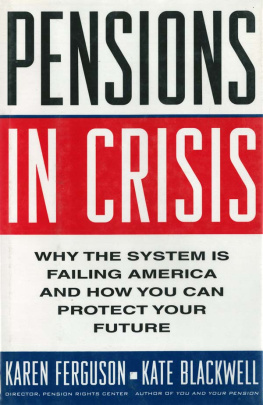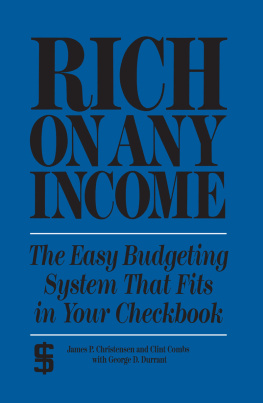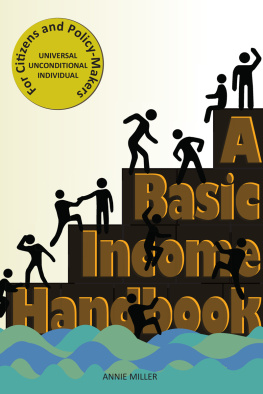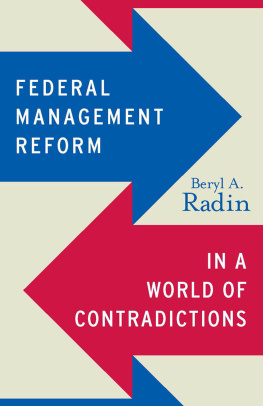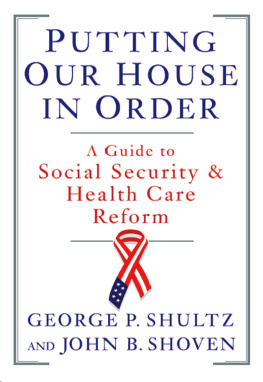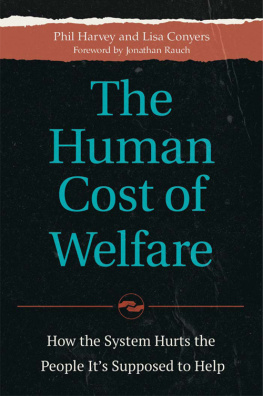The Politics of Loopholes
The Improbable Prospects for U.S. Tax Reform
John F. Witte

Copyright 2017 by John F. Witte
All rights reserved. No part of this publication may be reproduced, stored in a retrieval system, or transmitted, in any form or by any means, electronic, mechanical, photocopying, recording, or otherwise, except for the inclusion of brief quotations in a review, without prior permission in writing from the publisher.
Library of Congress Cataloging-in-Publication Data
Names: Witte, John F., author.
Title: The politics of loopholes : the improbable prospects for U.S. tax reform / John F. Witte.
Description: Santa Barbara, California : Praeger, [2017] | Includes bibliographical references and index.
Identifiers: LCCN 2016031515 (print) | LCCN 2016046372 (ebook) | ISBN 9781440843419 (hard copy : alk. paper) | ISBN 9781440843426 (ebook)
Subjects: LCSH: Income taxUnited States. | TaxationUnited States. | Income taxPolitical aspectsUnited States. | Fiscal policyUnited States. | United StatesPolitics and government2009
Classification: LCC HJ4652 .W693 2017 (print) | LCC HJ4652 (ebook) | DDC 336.24/150973dc23
LC record available at https://lccn.loc.gov/2016031515
ISBN: 978-1-4408-4341-9
EISBN: 978-1-4408-4342-6
21 20 19 18 17 1 2 3 4 5
This book is also available as an eBook.
Praeger
An Imprint of ABC-CLIO, LLC
ABC-CLIO, LLC
130 Cremona Drive, P.O. Box 1911
Santa Barbara, California 93116-1911
www.abc-clio.com
This book is printed on acid-free paper 
Manufactured in the United States of America
For Amy and Dylan, David and Binky, and our grandchildren, Maizy, Boone, and Valentine.
Contents
List of Tables and Figures
TABLES
FIGURES
Preface
This book began as have many paths in my careerby a random event. ABC-CLIO/Praeger suggested I do an encyclopedic volume on tax loopholes. I said I was not interested, although it would be worthwhile. However, I then began to wonder how tax loopholes had changed in the 30 years since I had written a book about the politics and development of the United States income taxes. Due to the miracle of the Internet, I was able to spend a day realizing that since I last wrote of tax loopholes in 1991, tax loopholes had seemingly exploded in numbers, cost, and reach.
That realization led to this book as a follow-up, 30 years later, to my earlier work. But there were to be three major differences. First, that book not only analyzed tax loopholes, but it also included extensive analysis of major tax legislation and the construction of tax bills over seven decades. This book does not do the latter. Others have very effectively accomplished that task. Rather, this book focuses on tax loopholes, updating my earlier analyses. Second, the tone of this book is different. In the first, I was appalled at the income tax system that had evolved over time. This time, being considerably older and more experienced with public policy issues in a complex democracy, I am less jaded and more understanding of the constraints under which elected politicians operate. And that has led to the third major differencethat now I argue it may be time to rethink the income tax in terms of being a vehicle not only to raise needed revenues, but to also achieve nonrevenue policy objectives. And that means rethinking tax loopholes and how we may use them in a positive way.
Acknowledgments
I thank my wonderful graduate research assistant, Fei Wang. Jessica Gribble of ABC-CLIO/Praeger has been encouraging, attentive, and continuously supportive from the onset of this project. I also want to acknowledge probably the greatest tax policy resource in the world, or surely in the United States: The Urban/Brookings Institutions Tax Policy Center. Their resources are phenomenal. I expressly thank Lydia Austin and Gene Steuerle. As always, I appreciate the love and continuous support of my wife, Mary Witte.
ONE
Introduction
I also think the IRS is implementing a horrible tax code. And I think the real solution at the end of the day is comprehensive tax reform, something our agenda project is going to be working on. What I think we need to do is win an election, get better people in these agencies, and reform the tax code so were not harassing the average taxpayer with a tax code they cant understand.
Speaker of the House of Representatives and former Chairman of the House Ways and Means Committee Representative Paul Ryan (R-WI) on Tax Day, April 18, 2016
BEGINNINGS
It is strange that something as mundane as taxes may well be the most important policy regime in modern democraciesand it is getting more important every year. Without taxes, modern governments do not function. Without adequate taxes, modern governments are dysfunctional (e.g., Greece in 2015). Average citizens know little about taxes and may not care much about them as a policy issue. They generally disparage them, but they do pay them in all developed countries. And no one denies that they involve, and hence attract, considerable money. One of the best-selling and wonderfully informative books about American taxes was not called Showdown at Gucci Gulch by accident. However, as we will see in detail in the pages that follow, tax policy is now about much more than raising trillions of dollars in revenues used to fund the government. It also currently accomplishes much more in terms of substantive nonrevenue policies.
This book is about income tax policy and politics in the United States in 2016. The date is required because tax policy is an evolutionary process defined over time and circumstance. Tax policy and politics were not the same when we first created the income taxes (corporate first in 1909, then individual in 1913) as they were a short few years later following World War I (WWI). And they certainly were not the same as they are today. The substance, shape, size, and structure of tax laws are constantly changing, much to the consternation of many tax policy practitioners and experts. However, that change is only one part of the story of this book. The other is that there are common threads, processes, and incentives that infuse the politics of taxation. And those may be more important as we look to the future of how we should approach and rethink tax policy in the United States.
In a recent online article, Leonard Burman, the director of the prestigious and infinitely valuable Urban-Brookings Institutions Tax Policy Center, reminded the tax policy world that tax reform was still alive and that it should be. He wrote:
Americans dont agree about much these days, but they apparently all agree that the federal tax system is unfair, inefficient, and mind-numbingly complex. And did I mention that it hasnt come close to paying for government in more than a decade? If NSA [National Security Agency] were tracking tax-reform chatter, the spooks might conclude that an overhaul is imminent. Presidents Obama and Bush both ordered reform studies, which were duly prepared. A host of bipartisan groups, including the National Commission on Fiscal Responsibility (a.k.a. Bowles-Simpson), have proposed broad cuts in subsidies. Then, too, the chairmen of the congressional tax-writing committeesDemocrat Max Baucus in the Senate and Republican David Camp in the Houselaunched an odd couple public relations tour aimed at building support for tax reform complete with a Max & Dave twitter handle, @simplertaxes.
As of this writing, both the leading Democratic and Republican 2016 presidential candidates have advanced major tax policy proposals. Republicans would promote various forms of classic tax reforms, broadening tax bases and reducing marginal rates. Senator Ted Cruz proposes radical plans to abolish both income taxes, payroll taxes, and the estate and gift taxes, replacing the lot with a very broad-based individual income tax with a flat rate of 10 percent, and a new broad-based value-added flat tax of 16 percent. Oh yes, he would also do away with the Internal Revenue Service. Trump would lower all marginal tax rates with a high rate of 25 percent; a zero bracket of $25,000 for singles, and $50,000 for couples. As with Cruz, he would retain the mortgage interest and charitable deductions but repeal or severely limit most other tax expenditures, and eliminate the estate and gift taxes. They would both repeal the Affordable Care Act (ACA) with its numerous tax loopholes.
Next page

